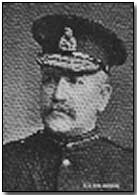Who's Who - Sir Charles Monro
 Sir Charles Carmichael Monro
(1860-1929) was responsible for overseeing the
evacuation of the Gallipoli
peninsula in October 1915, placed into effect in December 1915/January 1916.
Sir Charles Carmichael Monro
(1860-1929) was responsible for overseeing the
evacuation of the Gallipoli
peninsula in October 1915, placed into effect in December 1915/January 1916.
Monro joined the British Army in 1879 and served as a Major in staff positions during the South African War of 1899-1902. From 1901-07 Monro was commandant of the Hythe School of Musketry. In 1903 he was promoted to Colonel and in 1910 to Major General.
With the outbreak of war in Europe in August 1914 Monro was despatched to France in command of the British 2nd Division in Douglas Haig's I Corps. Haig's early assessment of Monro was decidedly unflattering: "rather fat".
He nevertheless played a role in the Mons retreat and during the First Battle of Ypres, both in 1914. In December that year he was again promoted, to Lieutenant General and handed command of I Corps, which he led at Aubers Ridge, Festubert and at Givenchy.
July 1915 brought Monro charge of the new British Third Army. Three months later he was despatched to the Gallipoli peninsula to replace Sir Ian Hamilton as regional Commander-in-Chief. Within a matter of days Monro issued his recommendation to Lord Kitchener, the minister of war: to evacuate the peninsula.
While his decision was undoubtedly correct he was also known to be a confirmed 'westerner', convinced that the war would be decided in on the Western Front rather than in any 'side show'. It took a personal visit from Kitchener himself to Gallipoli to confirm Monro's recommendation to pull out. Nevertheless his decision earned Monro the ire of Winston Churchill (who had initiated the Gallipoli expedition). He wrote in disdain of Monro: "he came, he saw, he capitulated".
Monro's management of the evacuation during December 1915/January 1916 was brilliantly conducted and casualties were remarkably low: a great deal fewer than Hamilton's original estimate of 50% (a figure which led to his recall to London).
Returning to France Monro was given command of First Army in January 1916, which suffered reverses at Vimy Ridge in May 1916 and at Fromelles the following month. In October the same year he was sent to India as regional Commander-in-Chief where he organised resources for despatch to the various fronts of the war as necessary and brought the efficiency of the Indian army to a new height.
Created a baronet in 1921 Monro served first as Governor and them as Commander of Gibraltar from 1923-28.
He died in 1929.
"Plugstreet" was British slang to describe the Belgian village of Ploegsteert.
- Did you know?
